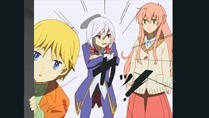 |
 |
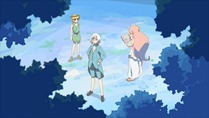 |
In 22 minutes, Jinrui wa Suitai Shimashita pretty much obsoleted Bakuman as a chronicle of the manga industry.
Well, not really – I love Bakuman, so please watch it or read it if you haven’t. But that doesn’t change the fact that Jinrui has somehow managed to shoehorn even more brilliance and mass tonnage of ideas into an episode than it did last week. As high as my expectations for this show were – and it was my pick for best series of the Summer – through four episodes they’ve been exceeded. Jinrui is categorically one of the smartest and most insightful anime I’ve ever seen.
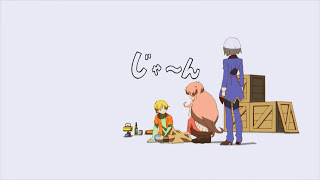 After stripping the flesh from the doujinshi trade last week and laying it bare for all to see, Jinrui turns its attention to the mainstream manga industry to conclude the two-part “Faries Subculture” arc. I know a little about the manga industry – I mean, I’m a huge fan, I’ve watched Bakuman, I’ve read up on it as much as I could – but I’m certainly no expert. As blown away as I was by this episode, someone who really knew that world (or even lived it) must surely have been even more floored – in a very disquieting sort of way. Tanaka Romeo’s satire is savage and brutal – absolutely pitiless and to the point.
After stripping the flesh from the doujinshi trade last week and laying it bare for all to see, Jinrui turns its attention to the mainstream manga industry to conclude the two-part “Faries Subculture” arc. I know a little about the manga industry – I mean, I’m a huge fan, I’ve watched Bakuman, I’ve read up on it as much as I could – but I’m certainly no expert. As blown away as I was by this episode, someone who really knew that world (or even lived it) must surely have been even more floored – in a very disquieting sort of way. Tanaka Romeo’s satire is savage and brutal – absolutely pitiless and to the point.
 Plainly speaking, there was enough intellectual content here to power three or four episodes easily (and the line to see that would form behind me). Any one of the subsections of the plot could have been explored further – and even more, the genre parodies could have been extended without any difficulty whatsoever. But what we got was a non-stop barrage of satire and farce, entertainment and hilarity for 22 blistering minutes. Indeed, as Watashi suggested, this scenario of being trapped in a manga was the Fairies doing. Some of the ground rules were truly ingenious – the brighter the lighting, the more popular the manga is because it means more people have it open. The panels ascend and descend based on popularity, and in order to “clear” a panel, something exciting has to happen (Da-dum!).
Plainly speaking, there was enough intellectual content here to power three or four episodes easily (and the line to see that would form behind me). Any one of the subsections of the plot could have been explored further – and even more, the genre parodies could have been extended without any difficulty whatsoever. But what we got was a non-stop barrage of satire and farce, entertainment and hilarity for 22 blistering minutes. Indeed, as Watashi suggested, this scenario of being trapped in a manga was the Fairies doing. Some of the ground rules were truly ingenious – the brighter the lighting, the more popular the manga is because it means more people have it open. The panels ascend and descend based on popularity, and in order to “clear” a panel, something exciting has to happen (Da-dum!).
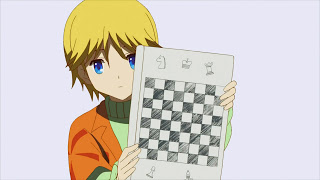 In reality, of course, what Jinrui is showing us here is a dramatization in the life of a mangaka – with all the requisite pressures and perils. Here, Y is forced to confront a completely different set of realities than she did as a “manzine” creator – this is all about mass appeal and financial survival. She proves herself adept at gimmicks and flavor of the moment tricks, but her style doesn’t have much staying power. Fortunately Joshu-kun is (in addition to practically being moe) both artistically talented (as we saw in episode 2) and pretty sharp – he’s the one who figures out most of the tricks of the trade the Fairies have left for the trio to navigate. And because this is mainstream manga, he’s thankfully not forced into any unsavory situations by the unscrupulous Y (though if there’d been another male trapped with them, who knows).
In reality, of course, what Jinrui is showing us here is a dramatization in the life of a mangaka – with all the requisite pressures and perils. Here, Y is forced to confront a completely different set of realities than she did as a “manzine” creator – this is all about mass appeal and financial survival. She proves herself adept at gimmicks and flavor of the moment tricks, but her style doesn’t have much staying power. Fortunately Joshu-kun is (in addition to practically being moe) both artistically talented (as we saw in episode 2) and pretty sharp – he’s the one who figures out most of the tricks of the trade the Fairies have left for the trio to navigate. And because this is mainstream manga, he’s thankfully not forced into any unsavory situations by the unscrupulous Y (though if there’d been another male trapped with them, who knows).
 Waiting at the end of all this, of course, is escape – or death, or whatever the nebulous fate the Fairies have promised for failure is. The agony is that the manga needs to maintain popularity and find a way to end while still on top – a near impossible challenge. This is the challenge of the mangaka – find a genre, climb in the polls and dodge the editors comments in the margin (“Only editors can use the margin!”), keep things exciting. The first course the trio takes comes from Assistant’s suggestion of a chess manga – because “People used to think analog games were moe”. When this turns boring he suggests baseball, but Watashi declares that “even more boring”. Even more genres are tried – Saint Seiya rip-off, romance – until Y hits on the dubious idea of throwing a cliffhanger at the reader every panel. Brilliant idea, right?
Waiting at the end of all this, of course, is escape – or death, or whatever the nebulous fate the Fairies have promised for failure is. The agony is that the manga needs to maintain popularity and find a way to end while still on top – a near impossible challenge. This is the challenge of the mangaka – find a genre, climb in the polls and dodge the editors comments in the margin (“Only editors can use the margin!”), keep things exciting. The first course the trio takes comes from Assistant’s suggestion of a chess manga – because “People used to think analog games were moe”. When this turns boring he suggests baseball, but Watashi declares that “even more boring”. Even more genres are tried – Saint Seiya rip-off, romance – until Y hits on the dubious idea of throwing a cliffhanger at the reader every panel. Brilliant idea, right?
 And so it seems – for a while. After all, Y tells the others, “If you give them anticipation and impact with every panel, they’ll ignore what came before!” And the manga rises in the polls, all the way to #1. “New character introduced! A new arc begins! Anime announcement!!!” All is bliss – except the readers eventually grow tired of being brought to the edge and never allowed to finish time and time again, and the manga becomes a hopeless tangle of genres and styles that makes no sense whatsoever. It begins to slip in the polls, forcing all kinds of desperation ploys like massive 2-page spreads – eventually landing (in a thoroughly appropriate development) an updating of “A Midsummer Night’s Dream” with Joshu-kun as Puck. But this too fails, and the end comes – and this is true disaster. For you see, mangaka have no marketable skills, and if a manga fails when they’re in their 30s or 40s, it’s too late to do anything else. In the end things are so bad the trio are reduced to a storyboard (“You could at least have inked it!”) and the manga goes straight to the ban list as Watashi descends into the abyss to receive her punishment – but fortunately it’s not death. No, it’s the curse of taking over the family business – which as it happens, she’s already doing.
And so it seems – for a while. After all, Y tells the others, “If you give them anticipation and impact with every panel, they’ll ignore what came before!” And the manga rises in the polls, all the way to #1. “New character introduced! A new arc begins! Anime announcement!!!” All is bliss – except the readers eventually grow tired of being brought to the edge and never allowed to finish time and time again, and the manga becomes a hopeless tangle of genres and styles that makes no sense whatsoever. It begins to slip in the polls, forcing all kinds of desperation ploys like massive 2-page spreads – eventually landing (in a thoroughly appropriate development) an updating of “A Midsummer Night’s Dream” with Joshu-kun as Puck. But this too fails, and the end comes – and this is true disaster. For you see, mangaka have no marketable skills, and if a manga fails when they’re in their 30s or 40s, it’s too late to do anything else. In the end things are so bad the trio are reduced to a storyboard (“You could at least have inked it!”) and the manga goes straight to the ban list as Watashi descends into the abyss to receive her punishment – but fortunately it’s not death. No, it’s the curse of taking over the family business – which as it happens, she’s already doing.
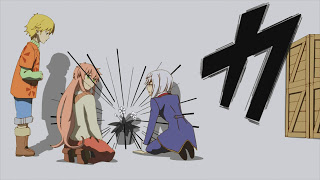 Now, I suppose you’re either going to find all that hilarious or not – much like all comedy, really – but for me, it was truly spectacular. So smart, so on-point, shedding so much insight on reality through absurdity – which is exactly what great satire is supposed to do. And this is great satire, no doubt about it – the best I’ve seen in anime in years. As a bonus, I’m really loving both Watashi and Joshu-kun as characters. Watashi’s smiling snark and world-weary asides are a constant delight, and her relationship with Assistant (the scene where she “translated” his lines was a classic) is actually providing some humanity to the show. It seems to be based on real “Onee-san” type affection from Watashi, the one element in the show that doesn’t come off as ironic – and it really works in that context. I could go on and on about how much I love the two of them, and this show – but you get the picture. This is easily the best new series of the season for me and I only wish it were slated for more than one cour.
Now, I suppose you’re either going to find all that hilarious or not – much like all comedy, really – but for me, it was truly spectacular. So smart, so on-point, shedding so much insight on reality through absurdity – which is exactly what great satire is supposed to do. And this is great satire, no doubt about it – the best I’ve seen in anime in years. As a bonus, I’m really loving both Watashi and Joshu-kun as characters. Watashi’s smiling snark and world-weary asides are a constant delight, and her relationship with Assistant (the scene where she “translated” his lines was a classic) is actually providing some humanity to the show. It seems to be based on real “Onee-san” type affection from Watashi, the one element in the show that doesn’t come off as ironic – and it really works in that context. I could go on and on about how much I love the two of them, and this show – but you get the picture. This is easily the best new series of the season for me and I only wish it were slated for more than one cour.
 |
 |
 |
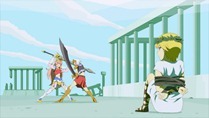 |
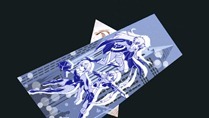 |
 |
 |
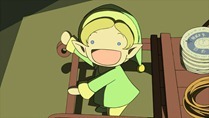 |
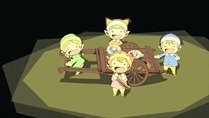 |
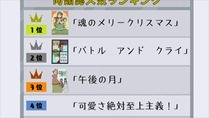 |
 |
 |
 |
 |
 |
 |
 |
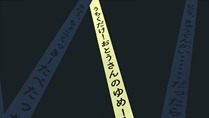 |
 |
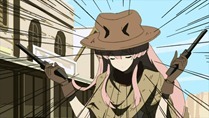 |
 |
 |
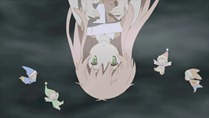 |
 |


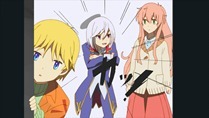



Click
July 23, 2012 at 1:54 amI love this show. Watashi is probably the best comical snarker since Kyon, and Jinrui as a whole may be the most self aware show to not break the fourth wall since The Melancholy of Haruhi Suzumiya.
Anonymous
July 23, 2012 at 1:57 amI love this show. When I first read about Jinrui wa Suitai Shimashita I was expecting it to be like Hakushaku to Yōsei(which I did enjoy). This is just a very good show I just wish it was more then one cour also.
SQA
July 23, 2012 at 2:28 amAh, our savage and dark comedic satire, with a lively, storyboard look. I love this series so much. 🙂
Kentaiyoshimi
July 23, 2012 at 2:50 amThis was the best episode thus far. I loved Bakuman, so this episode was right up my alley. This ep was hilarious, yet hits very close to home.
Y's various attempts at popularity is essentially what happened with Bleach. However, it simply means that Tanaka does acknowledge the existence of these problems in the manga industry.
Ren
July 23, 2012 at 3:04 amWell, the first two episodes were delightfully weird and funny while these last two episodes were not as funny, but absolutely brutal satire and smart.
Lemme see.
"People used to think analog games were moe, When this turns boring…" –>chihayafuru
"baseball, but Watashi declares that even more boring” –>Cross Game
Does this sound about about right, GE? (Hey, I didn't say they were boring, just, merely connecting dots!)
Brutal line like "manga artists are without marketing skills, too old to be civil servants" were quite something. Now that's a courage we need more on an anime medium! And I'd like to see Watashi flipping and going batshit at some point like Rena Ryuuguu character from Higurashi. Why not, they share the same voice actress!
SQA
July 23, 2012 at 4:08 amThe "analog games were moe" is probably more directed at "Hikaru no Go" and a few other titles in that genre. Chihayafuru just being the most recent example.
The Baseball joke could have been about pretty much anything Adachi-sensei has done, actually. Haha.
admin
July 23, 2012 at 3:26 amNo exaggeration, this was among the best anime episodes I can recall, any genre. Satire just doesn't get much better.
Ren, I honestly don't think CG and Chiyafuru were specifically in Tanaka's mind, as they mostly avoid the sort of traps he's talking about here.
Anonymous
July 23, 2012 at 11:28 pmThe author was talking about Saki, then?
admin
July 24, 2012 at 12:03 amI think he's more interested in satirizing genres than specific series, to be honest.
Anonymous
July 23, 2012 at 4:23 amThis episode was pure gold. Certainly a few manga came to mind. The use of 2-panels, cancellations, cliffhangers (seriously, what's up Kubo?), and the last part where they were reduced to storyboards was very reminiscent of Hunter x Hunter. However, instead of cancellation, Togashi hasn't been feeling well and went on hiatus.
Definitely one of my favorites this season.
Beckett
July 23, 2012 at 7:58 amAnother smashing good episode of this show. I seriously prefer this show when it's in sharp satire mode rather than wacky random hijinks mode. I hope the rest of the series will continue in this vein.
Also, hopefully Y will be a regular and not limited to just this arc cause I think she's great.
Seishun Otoko
July 23, 2012 at 3:35 pmAs always, excellent review by the great Enzo sama 😉
Quirky and smart at the same time, this is definitely the best episode yet. While it took me some time to warm up to Jintai, the last two episodes completely blew me away. As much as I'm enjoying the character dynamics between Watashi and Joshu-tan, I hope Y sticks around and stir up more trouble for our dynamic duo. She's hilarious and more Sawashiro Miyuki is always a plus XD
admin
July 23, 2012 at 3:46 pmI confess I feel differently here, as Y is one element I hope she isn't a major factor going forward. She was the irritant that helped produce the pearl here, but for me a little will go a long way.
Highway
July 23, 2012 at 5:51 pmNot knowing as much about the manga industry, this was a show I enjoyed a lot more by not thinking about it (and how much I didn't really know about it). So while I got some of the popularity contest satire and the genre-madness, there wasn't much specifically about manga that I could relate it to.
As far as the series in general, I liked that they actually finally showed the fairies as the force behind the predicament. Up until this point, they kept saying they were like this, but hadn't actually shown any capability like this. The setup kind of opens the question of 'who is the audience?' Is it other humans? Is it the fairies? Is it even anyone in particular, or just some 'audience' construct?
PocariSweat
July 24, 2012 at 1:42 pmI can't express how brilliant this episode was. Might have been the single best episode I've seen this year actually though I might be just on a high. I remember certain Fate Zero episodes or Sakamichi no Appollon episodes giving off a similar high, but they are all so different in genre and content in that it's not fair to compare.
Anyways, the manga industry social commentary in this was gold. The fujioshi/yaoi topic of last episode was ok, but going broader and talking about manga in general was a brilliant choice since it isn't poking fun at a niche portion of the fandom, but an industry as a whole. Bravo Jinrui! Bravo
10/10 for this episode. My favourite of the season just keeps getting better and better.
Jay
August 2, 2012 at 12:34 amIm a little disappointed that they didnt talk about over the top fanservice but everything else was on point. Im so happy I took a chance on this show.